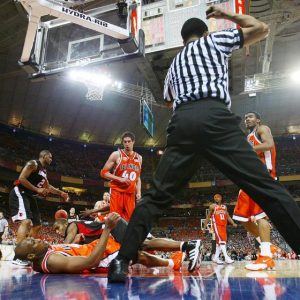 I attended Division I Oakland University’s practice the other day and Coach Greg Kampe had to stop practice and remind a defensive player to keep his hand off the ball handler. This reminded me of how easy it is for players to actually practice bad habits, including all the various ways players can practice fouling.
I attended Division I Oakland University’s practice the other day and Coach Greg Kampe had to stop practice and remind a defensive player to keep his hand off the ball handler. This reminded me of how easy it is for players to actually practice bad habits, including all the various ways players can practice fouling.
Coach Kampe alluded to hand checking being a point of emphasis this season and if you include those items, rule changes and all the leftover unchanged or un-emphasized rules, it’s a lot for any coach to digest, let alone a player.
That’s exactly why coaches should attack this problem head on by having a plan to reduce the likelihood of players even inadvertently practicing attitudes and techniques that are earmarked for disaster in game situations. In this plan, I would include:
- In the pre-season, bring in the local supervisor of officials or several respected officials to review key concepts such as the block/charge, the principle of verticality, advantage/disadvantage etc. and in particular rule changes and points of emphasis. This session alone could prevent ongoing issues.
- Whether there is a budget or not, bringing in registered officials to referee 5 on 5 play as much as possible, especially in the pre-season. This can be as extensive as your budget and/or your creativity allows. Even several 30 minute sessions is better than the alternative. Having different crews with different officiating styles work your practices also helps players understand the notion of adjusting to the variations in officials’ approaches.
- When officials aren’t present, make sure that you and your staff are as consistent as possible in monitoring your players’ fouling. It’s very difficult to coach and “officiate” at the same time but the best coaches find a way to navigate around this quandary.
- Remember that players can also practice fouling at the offensive end with reckless ball handling, getting air bound on passes, going over the back, illegal screening etc.
- Remember that there are times when you actually want to foul when you need the clock to stop or have fouls to give. This too needs to be practiced. Stopping the clock gets botched up very often and wastes valuable time. Using one’s “fouls to give”-especially at the end of the first half is underutilized in general but in the hands of a master, is a sight to behold.
- Remember that playing aggressive with minimal fouling is a winning strategy and very achievable.


